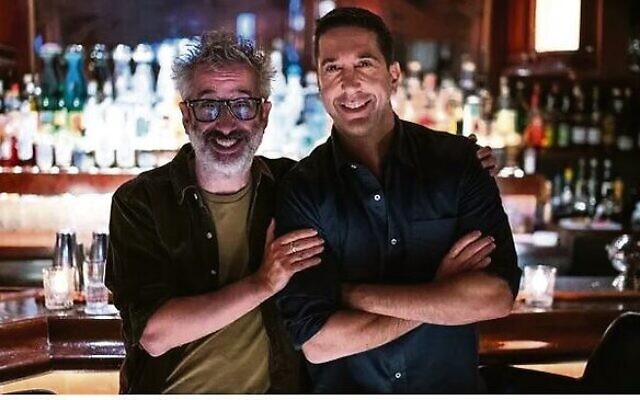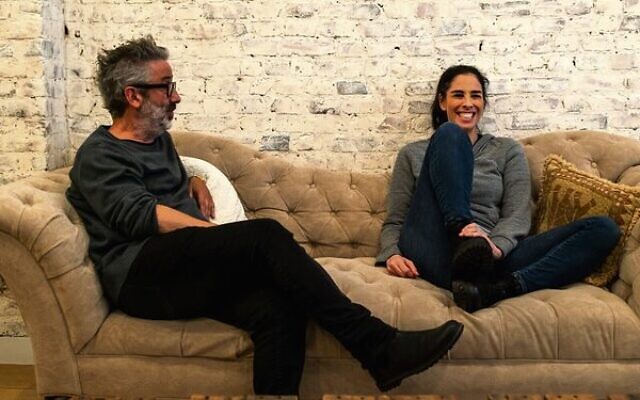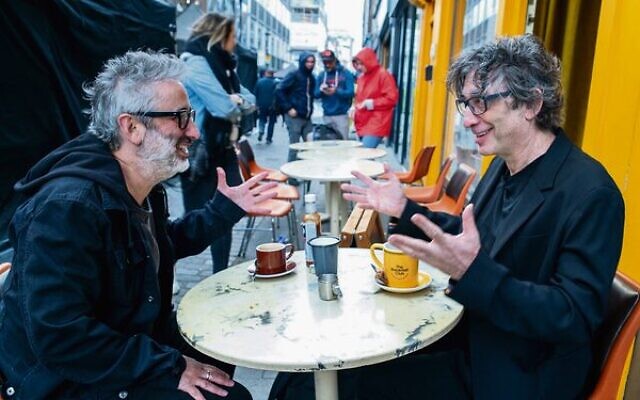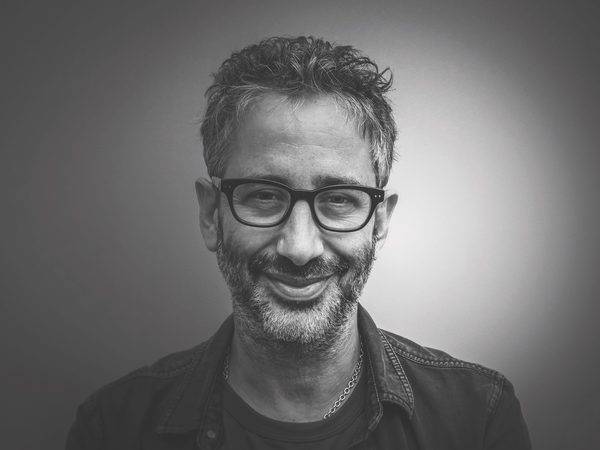“That’s the thing about stand-up comedy,” David Baddiel says, “how it goes wrong can be unclear. So I remember this one time the jokes just weren’t landing, and then at some point a man right at the back of the audience shouted, ‘the walls are closing in’. I remember thinking to myself, ‘Is that God commentating on this event?’ because it was a very deep voice. It was a weird heckle because it felt more like commentary on my existential state than anything else.”
The topic of God is, of course, one that Baddiel has gone to great lengths to explore, and the English comedian and author said he would be discussing it – and more – while in Australia.
Baddiel attended an Orthodox Jewish primary school in London, his mother and grandparents were Holocaust survivors, and he is “moved” by Jewish survival. In his latest book The God Desire Baddiel makes it clear that he is Jewish despite not necessarily believing in a “supernatural being”.
“The more I want to believe in God, the more I know that he’s a projection of desire,” Baddiel tells The AJN.
“But there are things about the religion that, even if I don’t believe in God, I find moving. So there’s a whole bit about listening to Kaddish at a funeral of a child – a friend tragically lost a child when he was young – and listening to Kaddish in English is meaningless to me, but in Hebrew it’s a pain that transcends. That touches me in a way that I think calls to centuries of cultural stuff within me.”
Positioning himself as a Jewish atheist might sound complex, even confusing, but Baddiel says it’s actually quite simple.
“One guy said to me, I now realise that antisemitism is the racism that sneaks past you.”
“I’m an atheist, but the Nazis would shoot me tomorrow,” he says. “So the key reason is I have no choice, Jews have no choice. A lot of people try and downgrade antisemitism from what it is, which is racism, to the lesser charge of religious intolerance. And they do that to be able to make antisemitism seem not as important. But antisemitism has very little to do with religion, especially in the modern age. Since the 19th century it’s to do with Nazis and white supremacists, and whoever else’s genocide of Jews – which is a lot of people – not checking whether those Jews keep kosher.
“They’re not interested in their religious beliefs, they just see them as genetically an alien being.”
Antisemitism, and the ignorance of it, is the issue Baddiel tackles in his best-selling polemic Jews Don’t Count. Essentially, it’s about how Jews don’t seem to count as a proper minority because the perception is that Jews are powerful and privileged.
“It’s an interesting thing, if a horrible thing, that there is an unconscious feeling that Jews calling out antisemitism has a kind of impertinence to it, for want of a better word,” Baddiel says. “Like, ‘here you are so rich and powerful and privileged and you’re complaining’. It means that Jews calling out antisemitism comes with a suspicion.”

After the book was published in 2021, Baddiel says he received many letters from young, university-going Jews. A lot of them were activists themselves, but they told him they felt they couldn’t call out casual antisemitism when they saw it on campus.
It’s a story not dissimilar to the recent findings of a nationwide survey of Jewish university students in Australia, which show 57 per cent of them choose to conceal their Jewish identity on campus to avoid antisemitism.
“Jewish students would see casual antisemitism, but they felt they couldn’t bring it up because they wouldn’t be seen as legitimate by these other very woke young people,” Baddiel says.
“But they told me the good thing about my book is that it gives them a way to challenge these people because it’s written with the knowledge of how progressives think and how campus thinking is. It uses all the language about unconscious bias and about structural oppression and it asks, ‘Why does this stuff not apply to Jews?’
“It’s worked in some cases because I have had progressives say to me, ‘you know what, I’ve read your book and I realised that there are assumptions that I’ve had about Jews that I didn’t know I had.’
“One guy said to me, I now realise that antisemitism is the racism that sneaks past you.”
Baddiel has since made a documentary called Jews Don’t Count, based on his book. In it, he interviews a number of high-profile Jews including Sarah Silverman, David Schwimmer and Jonathan Safran Foer as he sets out to explore why so many people seem to ignore antisemitism.
“One of the things that’s slightly different with it from a standard documentary, is that I’m not trying to go on a journey,” he says.
“I know what I want to say about this type of antisemitism and I had to find a way of doing that.”
Baddiel says the documentary is funny in parts, but it’s also deeply moving. In one part, he returns to his old primary school and explains the security drills Jewish children must go through regularly. For anyone not familiar with this, it’s an eye-opening scene.

“I begin by reading a book to the kids, before I have to go outside into the corridor while the alarm goes off and they do this security procedure,” Baddiel says.
“We don’t show their security procedures, you’re not allowed to, but while I was in the room, a kid asked me if every school has to do this. I couldn’t tell him no because he’s just assumed that every child in every school has to do these high-level security procedures and I didn’t want to shatter that. That’s really heartbreaking.
“Jewish schools are vulnerable to attack, yet antisemitism isn’t considered as important as other forms of discrimination or racism. One of the points I’m trying to make is here is why that’s stupid at the end of it – Jewish children are actually under threat.
“I found that to be quite difficult to do and I felt like I was going cry when I was doing it.”
In recent weeks Baddiel has been asked by several media outlets to give his opinion on the casting of Bradley Cooper as Jewish composer Leonard Bernstein in the upcoming movie Maestro.
This is an issue he has commented on previously – garnering mixed responses – notably when Helen Mirren played Golda Meir and when he questioned the casting of Cillian Murphy as Jewish nuclear physicist J Robert Oppenheimer in the film Oppenheimer.
“My position on that is that I don’t care that much about casting in general and acting in general, what I care about is how Jews are left out of modern strictures around discrimination and racism, and one of those strictures is authenticity casting,” Baddiel says.
“So there’s a belief now, and whether it’s right or not I don’t really care, that if you’re casting a minority you should cast an actor from that minority. A good example of that is Marlee Matlin in CODA, who is deaf. She said, ‘deaf is not a costume,’ by which she means I don’t want, as a deaf person, to see people pretending they can’t hear because I find that slightly offensive.
“So it’s not just ethnic categories, it’s disabled people and gender categories and all sorts of things. Now, there’s a sort of anxiety which is quite complicated and difficult for actors who want to act, but there’s anxiety around should we be casting an autistic character with a non-autistic person because that feels disrespectful, right? Except for Jews.
“And my problem with that is, what does that say about what how people see Jews, which is that Jews are somehow not a proper minority. They’re not quite the same as these other people, they don’t matter that much, their feelings aren’t as important. And that’s what I have a problem with – the fact that Jews are left out of it.”

While many might disagree, it’s important to note that Mirren herself admitted that questions over the choice to have her play Israel’s first female prime minister were “utterly legitimate”. The biopic Golda was directed by Guy Nattiv and set during the 19 days of the Yom Kippur War in 1973.
“It was certainly a question that I had, before I accepted the role. [Meir] is a very important person in Israeli history,” Mirren told The Daily Mail last year.
“I said, ‘Look, Guy, I’m not Jewish, and if you want to think about that, and decide to go in a different direction, no hard feelings. I will absolutely understand.”
The idea of authenticity casting has come into question many times recently. Eddie Redmayne reassessed his role in the 2015 film The Danish Girl, saying his decision to play a transgender woman was a “mistake”.
“Jewish schools are vulnerable to attack, yet antisemitism isn’t considered as important as other forms of discrimination or racism. One of the points I’m trying to make is here is why that’s stupid at the end of it – Jewish children are actually under threat…”
Ridley Scott’s 2014 Exodus: Gods and Kings was criticised for featuring non-Arab actors as Egyptians, while Jewish actor Jake Gyllenhaal played the lead in the 2010 film Prince of Persia: The Sands of Time, with many saying the role should have gone to an actor of Middle Eastern origin.
There’s been added controversy over Cooper’s portrayal of Bernstein because of the apparent use of a prosthetic nose, which some have suggested plays up to offensive Jewish stereotypes.
Bernstein’s family members defended Cooper in a statement, saying they were “perfectly fine” with the Oscar-nominated actor’s portrayal, but at first glance the prosthetic nose does appear larger than the size of Bernstein’s actual nose.
“As far as I can make out, it’s just the nose and it’s longer, so that draws attention to it more,” Baddiel says.
“I mean, the question is not is that okay or not. The question is, well: would that be okay if he was mimicking a feature or facial feature of another minority if he wasn’t part of that minority? That’s the issue.
“This is context now, by the way, because years ago white people dressed up as Chinese people. We don’t do that anymore and that’s the point. If someone tried to dress up like a Chinese person now and added some make-up they would be rightly condemned for it.”
Baddiel adds that the producers of Maestro must have known that casting Cooper, and changing the look of his nose, would have caused controversy.
“I do think one thing by the way, and that is they must have known this would have been an issue, the people making this film,” he says.
“And they thought, ‘We’ll take the flak, a certain amount of flak, because it won’t be that bad. It won’t be as bad as if we had done it with another minority and it will increase publicity for the film.’
“People will carry on talking about it, but the film won’t be brought down because of it.”


comments